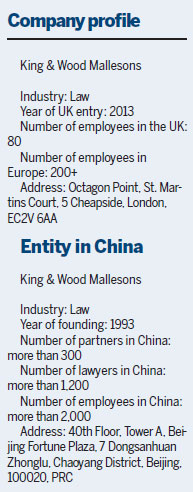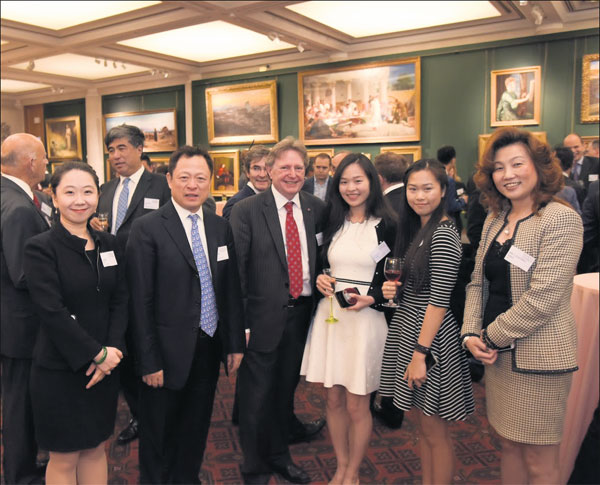Venturing across the legal borders

It's been a bumpy ride, but law firm is enjoying success in helping Chinese companies put together deals in the UK
Chinese law firm King & Wood Mallesons is rolling out innovative strategies to increase flexibility and timely responses in serving the current financial market's unprecedented level of cross-border deals.
The firm, which first entered the UK market in 2013, has quickly made a name for itself by advising on many high-profile deals, including China General Nuclear's investment in the UK's Hinkley Point C nuclear power station, and Yunyi Guokai (Shanghai) Sports Development's purchase of the UK's West Bromwich Albion Premier League football club.
| King & Wood Mallesons celebrates its growth in London with government officials and industry partners. Provided to China Daily |
"Over the past few years, we've worked on many Chinese deals, among other local works. We usually handle cases referred by our China partners, leveraging on our expertise and deep knowledge of both the Chinese and Western markets," says Mike Wang, partner at KWM, who leads the firm's China business in the EU.
"One key advantage we have is our flexibility, ability to adapt and think outside the box. We are able to innovate in order to satisfy our clients' requirements, and that involves implementing practices that we have perhaps not tried before," says Wang.
Flexibility and client focus for KMW is not just rhetoric, but ideologies deeply embedded in their daily practices. Advising on cross-border deals often requires KWM's lawyers to identify areas of cultural differences that may impede deals, and then provide adequate explanations to the client.

For example, when advising on CGN's investment in Hinkley Point, KWM had to explain to CGN why the British government's process of assessing the deal took so long, even though it was already endorsing the deal in principle.
CGN's £6 billion ($7.76 billion; 6.83 billion euros) investment into Hinkley was a major milestone, marking the first Chinese nuclear investment into an advanced economy. CGN made the investment as part of a consortium led by France's EDF. Although the UK government welcomed private sector investment into its nuclear sector, it still had to undergo the formal process of approval.
"We advised CGN throughout the process of getting UK government approval for their investment, and properly structuring the corporate model of their investment," Wang says.
In other deals, KWM needed to go beyond the traditional responsibility of a legal adviser, to provide business advice. Advising on Yunyi Guokai's purchase of the West Brom, KWM used its understanding of the UK sports market to emphasize the importance of retaining the TV broadcast license relating to the club, which is a key part of securing the asset value relating to the deal.
KWM also suggested Yunyi Guoka consider how to best maintain value for the club, especially in ensuring that the coach and players stay with the team.
KWM traces its origins back to 1993, when King & Wood was founded in Beijing as one of China's earliest law firms. In 2012, King& Wood took a brave step in international expansion through a merger with Australia's Mallesons Stephen Jacques, and the group was renamed King& Wood Mallesons.
Wang says KWM's international expansion was a natural process that followed the needs of its clients in China, who at the time already included two-thirds of the Fortune 500 companies, as well as many Chinese companies expanding overseas.

The merger with Mallesons Stephen Jacques effectively strengthened both firms' abilities to take on cross-border deals. Hoping to achieve the same effect in Europe, KWM merged with the UK-based law firm SJ Berwin.
This was not such a success. Initially it was seen as a positive deal, which immediately gave KWM additional capacity to take on many large-scale cross-border deals, but difference of opinion within the SJ Berwin team led to its gradual disintegration, and in January 2017 KWM's European arm filed for administration.
Essentially, what created the problem was that some of SJ Berwin's partners in London disagreed as to the extent the firm should focus on cross-border opportunities. Some partners preferred focusing more on UK local market deals and clients instead.
Adding to the problem, SJ Berwin as a firm was poorly capitalized. Because law firms often receive client payments weeks or months after they complete deals, within the legal firm industry it is customary for partners to lend their own money to their firm as working capital, to improve the firm's finances while awaiting client payment.
But when pressure came for KMW's partners to contribute money toward the firm, those former SJ Berwin partners who had preferred to focus on domestic deals refused. Tension escalated, which eventually led to the team's disintegration, and many of KWM's partners moved to rival law firms.
However, Wang and many others who believed in KWM's unique advantage in serving cross-border deals were not discouraged. A new team was established earlier this year, which now has 180 staff members across Europe, of which 80 percent are KWM workers from the days before administration.
Wang says he is not discouraged by the experience, because without the SJ Berwin merger, KWM would not have reached its current scale.
Wang's thoughts hold some truth, considering that KWM is now the largest Chinese law firm by employee number in the UK.
China's Zhong Lun Law Firm, which expanded into the UK through organic growth in 2011, now has just over a dozen lawyers in the UK. China's Yingke, another Beijing-based law firm operates in the UK through partnership with the British law firm Memery Crystal, meaning Yingke's own lawyers do not practice law within the UK jurisdiction.
KWM also learned many valuable lessons from administration, and now the team places far greater emphasis on team building and close collaboration between colleagues in different offices.
Previously, Wang was the only partner seconded from KWM's China offices to London, but now the China offices are preparing to send more partners and lawyers.
In February this year, KWM's UK team also traveled to China for a conference, to meet their China colleagues and develop team spirit. Now, many more of KWM's UK employees will be seconded in China.
To further strengthen the team's growth in cross-border deals, KWM recently launched a new strategy called "1-3-5", which gives clients guaranteed results within certain time frames. For each client enquiry, KWM promises to give preliminary suggestions within 24 hours, assemble a multidisciplinary and cross-border team within three days, and produce basic legal work or results relating to the deal within five days.
"In our day and age when 'globalization' and 'global solutions' are buzzwords, those terms are really beginning to lose their real meanings," Wang says.
"We want to quantify our promise to clients, because we know that, for cross-border deals, time is key. Often with international teams, so much time can easily be lost through time difference, and clients can feel frustrated when they do not hear a response from their legal advisers as quickly as they'd like," he says.
One factor helping the KWM team achieve a fast turnaround time is close collaboration between colleagues. All of the law firm's European partners use Wechat, the Chinese messaging app.
Wang, who arrived to the UK in 2014 after a long career in in KWM China, says the experience was a steep learning curve for him.
"I like my UK colleagues. They are very internationally minded, and I feel we have a common goal. Working as a team has taken some time for adjustments. I made compromises and so did they, but I feel that is what internationalization is about," he says.
Looking back at the not-so-ideal SJ Berwin merger, Wang is not too worried. "It gave us the chance to know each other, understand and respect the difference in culture and practice, and work together to find a common goal which leads to the stable and fast growth of the firm," he says.
cecily.liu@chinadaily.com.cn
(China Daily Africa Weekly 07/07/2017 page30)
Today's Top News
- Jimmy Lai found guilty of colluding with foreign forces
- Hong Kong court opens session to deliver verdict on Jimmy Lai's case
- China's economy posts steady growth in Nov
- Death toll rises to 16 in Sydney's Bondi Beach shooting
- Firm stance on opening-up wins praise
- World looks to new engines for growth in 2026































